- Home
- A. C. Crispin
V01 - V Page 2
V01 - V Read online
Page 2
But even as Mike Donovan recognized the man in the co-pilot's seat, the helicopter abruptly lifted, turned, and went zipping away. Huh? Now why the hell—
Donovan turned to see if by some miracle a tank had rolled up behind him (in total silence?! Don't be foolish, Mike . . .) and nearly dropped his precious camera. Even as he heard the low, pulsing hum, his startled eyes took in the huge shape drifting toward him over the distant mountains, dwarfing even their vastness.
Donovan felt his jaw sag; his mind screamed that he must've bought it—he couldn't still be alive and seeing this. Automatically his finger tightened on the shooting button, and he heard the camera record the incredible vision.
An oblate spheroid, just as he'd heard it described in those UFO stories, but it was so big! His fuddled mind tried to absorb the enormity of the ship, but as it loomed closer and closer, his sense of proportion simply gave out. A mile in diameter? More. Two miles? More—Big—
Finally it stopped, hanging in midair like an impossible dream. Donovan heard Tony shouting behind him, and turned to wave reassuringly at the soundman. As he slogged through the water toward his friend, one thought ran through Donovan's head like a broken record: How many people in history have been saved from having their asses shot off by a flying saucer?
The white mouse sat up on his hind legs, whiskers twitching, as he heard the cage door rattle. Food time? But his stomach told him no, it was not food time. Instead he felt a hand grasp him gently, lift him carefully, then turn him over. He recognized the scent, the voice that spoke, and did not struggle.
"Come on, Algernon. Show Doctor Metz your tummy."
"Remarkable!" Doctor Rudolph Metz leaned over to scrutinize the mouse's furry belly, then picked up a magnifying glass to inspect it more closely. "The lesion's nearly healed!"
The blonde young woman in the lab coat smiled, pleased by Metz's reaction. "Yes. In a few more days it should be completely normal." She stroked the mouse's head with one finger, then gently put him back in the cage.
Doctor Metz raised bushy salt-and-pepper brows, regarding her as intently as he had the mouse. "You know how long my research staff has been searching for that formula, Juliet?"
Juliet Parrish smiled, but shook her head. "It wasn't all my doing. Ruth helped a lot."
Ruth Barnes looked up from a microscope across the lab. "I heard that, and don't you believe it, Rudolph. She did it all."
"Well, I was very lucky." The fourth-year medical student carefully examined the latch on the mouse cage, not meeting the older man's eyes.
Metz nodded. "Luck happens in science, but usually only when accompanied by hard work and inspiration. The truth here, Juliet, is that you are very, very gifted. Research comes naturally to you."
Coming from Doctor Metz, this was an extraordinary compliment, and Juliet couldn't stop the flush of pleasure that warmed her face. Glancing over at Ruth, she saw the older woman give her a "thumbs up" sign of approval.
Metz watched the mouse as he frisked around his cage. "And furthermore, I warn you that Ruth and I are going to try and steal you from the med school. If you could devote your full time to biochemistry, you might—"
The laboratory door slammed back against the wall with a bang, making them all jump. Silhouetted in the doorway was a breathless young black man. "Have you heard about them?"
"Heard about what, Ben?" Doctor Metz was puzzled.
Doctor Benjamin Taylor flipped on the television set that sat high on a shelf in the lab. The small portable's face filled with Dan Rather's well-known countenance—at this moment, a very grave countenance:
". . . but wherever the reports have come from—Paris, Rome, Geneva, Buenos Aires, Tokyo—descriptions of the craft have all been identical. And—" He broke off, plainly listening to a voice in his earphone. "I'm told that our affiliate station KXT in San Francisco now has this visual."
The screen filled with the image of a huge vessel looming in across San Francisco harbor, filling the screen, so vast that the Golden Gate Bridge below it looked like a Tinker Toy. The three in the laboratory could hear the awe in Rather's voiceover:
"Yes, there it is—Good Lord, the size of it! Ladies and gentlemen, this picture is coming to you live from San Francisco."
Almost at the same moment, the four scientists heard a low, pulsing hum, barely within the range of human ears. The mice, however, shrilled and began to race frantically around their cages.
Juliet glanced over at Ben. "Do you think—"
As if in answer to her question, Dan Rather spoke from the television screen: "I'm also getting confirmation that another of the giant ships is moving in over Los Angeles!"
"Oh, God," Ruth said. The four scientists stared at each other.
Anthropologist Robert Maxwell leaned closer to his prize, brushing carefully at a vacant eye socket with far greater gentleness than he used when bathing his three-year-old daughter. Even so, Arch Quinton put up a cautioning hand. "Gently, gently, Robert. She's a verra' special lady . . ." His Scots burr was most pronounced when he was excited, and Maxwell grinned to himself, thinking that he'd never seen the older man more ecstatic over a discovery—though Quinton would die rather than break out of that "dour Scot" cover he affected.
"So your examination of the hip socket verified that she was female?" he asked. At Quinton's nod, he continued, dabbing carefully at the blackened, jagged teeth, "Upper Pleistocene, for sure, Arch. Much older than any we've uncovered at this site, wouldn't you agree?"
Quinton nodded. "The artifacts seem t' bear you out, lad. Also, look at her forehead, here—" His hand, which had been raised to brush gently at the wispy fragments of hair, paused, then turned into a point. "Robert, look at that!"
Even before Robert Maxwell could turn, he heard the sound—a vibrating pulse throbbing in his body as well as his ears. He turned to see a giant craft, silver-blue, sliding toward them as smoothly as if it ran on an invisible track. His hand tightened convulsively on the brush, and he pressed his body closer to the cliff, as though he would interpose himself between his find and the spaceship.
Elias Taylor squatted on the fire escape, glacing quickly around to make sure he was unobserved. Not much chance that anyone would be home, since it was the middle of the day, but Elias had never been caught yet, and didn't intend to break his record. Satisfied, he quickly taped the small pane over, his movements neat and economical. Then, a quick tap with a rock and—presto! The young man's teeth looked doubly white against his dark countenance as he grinned. Easy. Elias liked jobs that were easy.
Once inside the apartment, he trotted through the tiny rooms, looking for items that would be easy to carry, simple to fence. A Walkman caught his eye, and he flipped it on, listening intently to make sure that the tone was good.
A sock stuffed under the mattress of an unmade bed yielded nearly a hundred in cash. Elias grinned again as he counted it, shaking his head. They always hide the bread in the same places. Most folks have no imagination . . .
The only other thing that interested Taylor was a portable television. He turned it on, grimacing as he saw it was only black-and-white. Cheap suckers, I swear, he thought, ready to turn it off and make his exit. Black-and-whites were so cheap that it wasn't worth his energy to steal them anymore. His fingers hovered over the "off" switch, arrested by the image on the screen, what looked like (but couldn't be!) a live shot of a big UFO! Hastily he turned the sound up.
". . . along the Champs-Elysees. We repeat, this picture is coming live from Paris, where yet another giant UFO is moving overhead."
Elias sat, eyes widening, as the picture changed to a squadron of jet fighters scrambling into the air. The voice continued:
"The Pentagon reports that fighters from the Tactical Air Command bases around the United States have approached these monstrous UFOs, but all jets reported interference with their onboard guidance and electrical systems, forcing them to break off their attempts."
The scene shifted to a mob rushing madly along
a street, cars jammed in the middle, honking insanely—complete and utter chaos. Even the cops looked spaced-out, and no wonder, thought Elias, seeing another of the giant ships hanging (how the hell did they do that trick?) overhead. The scene reminded him tantalizingly of another, something he'd seen in the past, in a movie. As the camera panned to reveal the Washington Monument, Elias whistled softly to himself. "Shit," he mumbled, "it's old Klaatu and Gort come to Earth for real this time!"
The announcer was still talking: ". . . making it impossible to get within a mile of the craft. Missiles fired at the ships simply go astray, then detonate harmlessly well out of range. Police and troops are trying to maintain an orderly evacuation of the nation's capital . . ."
"Hell, too," mumbled Elias. "That sure don't look orderly to me!" He fingered the Walkman, wondering how this new development would affect the prices Reggie would give him on this stuff . . .
". . . and all the other cities that are threatened by this unprecedented happening, but roads and highways everywhere are jammed with traffic. Accidents have paralyzed all or most of the major arteries. Other craft are known to be approaching or hovering over at least seven other major U.S. cities—Houston, New York, San Francisco, New Orleans—yes, and this is now confirmed, Los Angeles . . ."
"L.A.?!" Elias nearly dropped the Walkman, rousing to realize that he was in a stranger's living room, and that the rightful owner might reappear any moment. Hastily he slid one leg over the windowsill, afraid to look up.
He heard it before he saw it. Clutching the Walkman, Elias decided to take the rest of the day off.
Mike Donovan pulled a blanket over Tony's gently snoring form, and moved forward to the Learjet's cockpit. Dropping into the copilot's seat, he glanced at the instruments. "Ahead of schedule," he commented.
Joe Harnell, the pilot, nodded. "How's your friend?"
"He's fine. The Scotch and codeine put him out. I can take her for a while, if you want to stretch your legs."
"Ever flown one before?" The pilot glanced quickly at Donovan.
"I've piloted almost everything except the shuttle, one time or another. Used to fly recon in Nam. Did you find out where we can set down?"
The pilot stood up, watching as Donovan took over the controls, then nodded approvingly before answering the newsman's question. "Yeah. So far Dulles is still open. We'd better take it. They're shutting down all over."
Donovan considered. "No, I got a hunch that New York is going to be the place to be as far as news goes. How about JFK?"
"Closed."
Donovan shrugged, grinning. "Let's open it. They can't roll up the runways, can they?"
"Hell, too. The FAA would have our—"
Donovan snapped his fingers. "No, I've got a better idea! La Guardia's much better!"
Harnell stared at him. "You nuts? That'd mean flying this sucker right under the goddamn thing!"
"Yeah! Think of the shots I could get!"
"No way, Mike."
Donovan grinned at him. "Come on, think of the bucks the film will be worth! I'll share the credit with you . . ."
Harnell stared at him in disbelief. Donovan gave him a wink and went to get his camera.
The next morning the Bernstein family, Stanley, Lynn, their son Daniel, and Stanley's father, Abraham, watched in amazement as Mike Donovan's film showed the view of the underside of the great craft that hung over New York City. Like the one in Los Angeles, where the Bernsteins lived, it had remained stationary and silent throughout the long (and at least for Lynn Bernstein) sleepless night.
Daniel, who was eighteen, was fascinated by the spacecraft. All his life he'd been waiting for something exciting to happen to him, and here it finally had. Never mind that it had happened to the rest of the world too—something told him that this was what he'd been waiting for. He turned excitedly to his father, a thin-haired, sad-eyed man with a permanent stoop and the beginnings of a potbelly.
"They say it's a good five miles in diameter, Dad!"
His mother, Lynn, a nervous woman who might have been attractive if not for the deep lines between her eyes and her permanently thinned lips, wrung her hands in her lap, saying for the hundredth time to nobody in particular, "We ought to leave the city, don't you think?"
Stanley Bernstein glared at his son. "I told you before, Lynn, where would we go? The roads are jammed, they say. Besides, as the president pointed out, we ought to avoid panic. They haven't done anything to indicate they're hostile."
Old Abraham shifted uneasily on the couch. "I wonder if there is any place left to hide. Even the Germans during the war had no ships like these."
"Father," Stanley said reprovingly, "that doesn't help—"
Their attention shifted abruptly back to the television screen. A somewhat hoarse but still professional Dan Rather was saying: ". . . They have reported the same occurrence now in Rome . . . and Rio de Janeiro . . . Moscow . . . Yes, the reports are flooding in—that same tone is being repeated all over the world from the spacecraft hanging over our cities—"
The Bernsteins heard the pulsing signal simultaneously from the television pickup and also from outside their suburban Los Angeles home. A tone, swiftly echoing, then changing to a voice!
"Twenty-one . . . twenty . . . nineteen . . . eighteen . . ." The strangely resonant voice continued the countdown while the news commentator explained that all over the world people were hearing the same thing—each in the appropriate local tongue.
". . . five . . . four . . . three . . . two . . . one." After a second's pause, the voice continued, "Citizens of the planet Earth . . . we bring you greetings. We come in peace. May we respectfully request the Secretary General of your United Nations please come to the top of the United Nations Building in New York at 0100 Greenwich Mean Time this evening. Thank you."
Stanley blinked. "What time is that?"
Dan Rather answered, obligingly, from the television. "The voice we have just heard requested the presence of the Secretary General at the top of the United Nations Building in New York City at eight o'clock this evening."
Lynn clutched frantically at her husband's hand. "What will this mean, Stanley?"
Daniel turned to grin at her, ecstatic. "It means something is gonna happen, Mom . . . finally! Isn't it great?"
Chapter 2
Sunset was a dim red memory on the New York western sky as Mike Donovan panned his camera across the lights of Manhattan. Late summer wind whipped his already rumpled hair—the breeze was stiff this high up. The top of the United Nations Building. Donovan checked his watch again. Seven fifty and forty-five seconds. Not quite ten minutes to go.
The roof door slammed, admitting yet another crowd of journalists and technicians. Mike spotted a familiar black head and hurried over to greet Tony Leonetti, helping his friend carry his equipment over to the roped-off line. Donovan noted Leonetti's grimace as he moved his shoulder.
"You sure you're gonna make it, Tony?" Tony grinned. "The news event of the century? Man, I ain't about to miss it!"
"Mike?" Both men turned as a woman's voice reached them.
Donovan's eyes held hers as she walked toward them, a tall, very well-groomed woman in her early thirties. Everything about her, from her expertly applied makeup and hairstyle to her level, measuring gaze, proclaimed her as one of the most prominent television reporters in the business. "Uh, hello, Kristine."
"Hello, Mike. Hi, Tony." She nodded pleasantly to Tony, who returned her greeting. "I heard you drew the TV pool. Me too."
Donovan smiled knowingly. "I thought I recognized your card in the pile downstairs. Figured you wouldn't miss this one."
She returned his smile a little sheepishly. "So where are we setting up?"
He pointed to the roped-off line beyond which stood a contingent of UN military police. With a nod, Tony excused himself to set up his equipment. Donovan hesitated, looking over at the bustle of camera crews, their faces ranging from strained worry to hectic gaiety. From far below he could hear the
ever-present wail of sirens.
Kristine took his arm. "Mike? Let's get set up."
He started. "Yeah. I was just . . . thinking."
Her glance was knowing. "So was I. You could've at least said good-bye before you left that morning."
"I did. You were on the phone, hustling somebody for an assignment, and didn't hear me."
She paused, turned to him, her green eyes eloquent. "I'm sorry."
Donovan smiled, a little tensely. "So was I."
Their eyes held for several seconds, then she looked away. "What time is it?"
Donovan checked his watch. "Seven fifty-six."
Kristine hurried away to check her last-minute preparations. Donovan busied himself with his camera settings. The minutes crawled by.
At seven fifty-nine, a distinguished white-haired man emerged, flanked by armed escorts. Donovan recognized him as the Secretary General and watched as he waved to the rooftop troops to lower their weapons. Donovan trained his camera on the gigantic floodlit shape of the alien craft hovering far above them, so enormous it dwarfed the tallest of the skyscrapers. He could hear someone counting down under his breath.
One of the newsmen was speaking into a mike: ". . . and a hush has fallen . . . not just here, I am sure, but around the world . . ."
"Nine . . . eight . . . seven . . . six . . ."
Five, thought Donovan, four, three, two, one—
" . . . as eight o'clock strikes . . . 0100 Greenwich Mean Time."
Donovan stared upward, the viewfinder of his camera pressed against his eye. His eye watered as he tried not to blink.
There! Something—hard to make out in that silver-blue vastness—a tiny dark opening! Donovan allowed himself that blink, then squinted back at the ship.

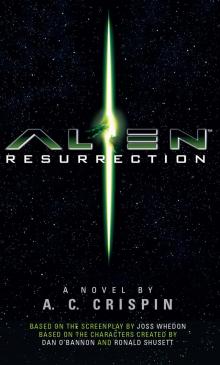 Alien Resurrection
Alien Resurrection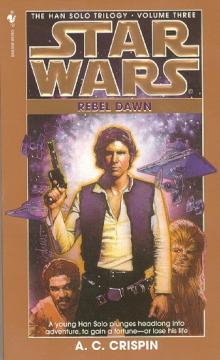 Star Wars - The Han Solo Trilogy - Rebel Dawn
Star Wars - The Han Solo Trilogy - Rebel Dawn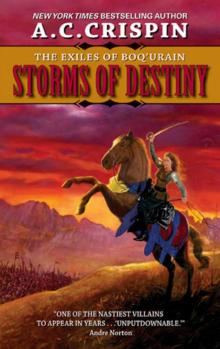 Storms of Destiny
Storms of Destiny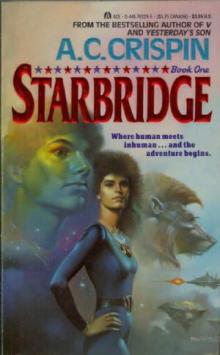 Starbridge
Starbridge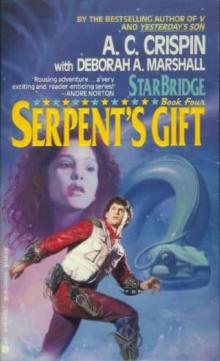 Serpent's Gift
Serpent's Gift Pirates of the Caribbean: The Price of Freedom
Pirates of the Caribbean: The Price of Freedom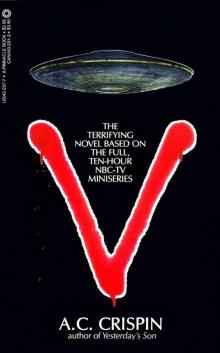 V01 - V
V01 - V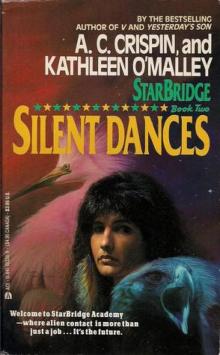 Silent Dances
Silent Dances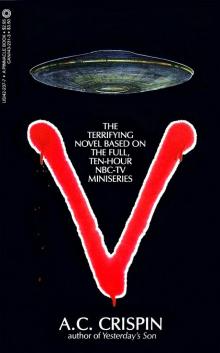 V
V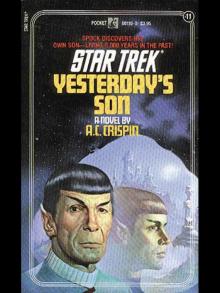 Yesterday's Son
Yesterday's Son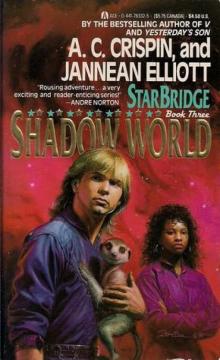 Shadow World
Shadow World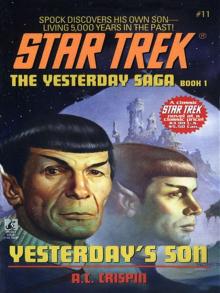 STAR TREK: TOS #11 - The Yesterday Saga I - Yesterday's Son
STAR TREK: TOS #11 - The Yesterday Saga I - Yesterday's Son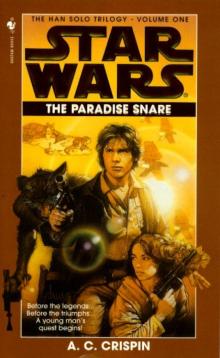 Star Wars - Han Solo Trilogy - The Paradise Snare
Star Wars - Han Solo Trilogy - The Paradise Snare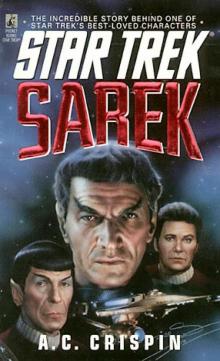 Star Trek - Sarek
Star Trek - Sarek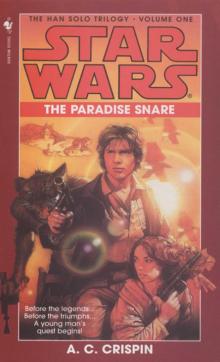 Star Wars: The Han Solo Trilogy I: The Paradise Snare
Star Wars: The Han Solo Trilogy I: The Paradise Snare